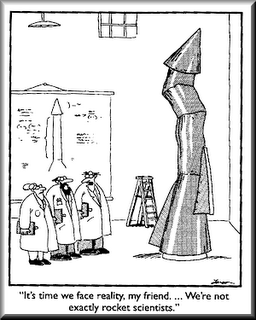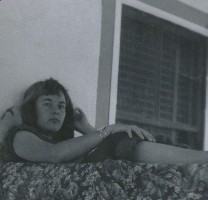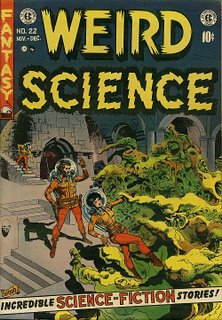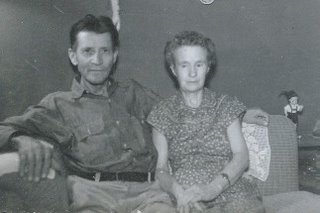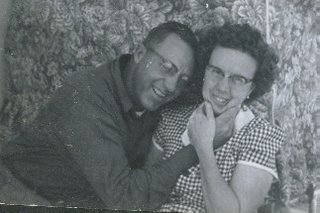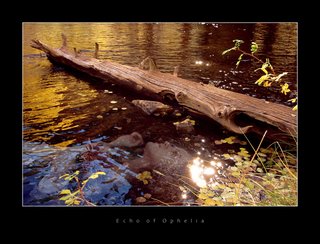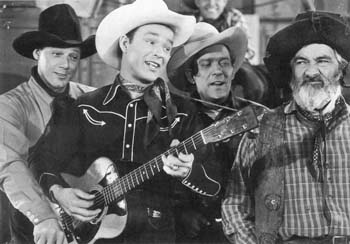
Sherman E. Burroughs is the name of my High school. The school was on the Navy Base itself, you had to check in at "the Gate" before you could enter, and you had to have "a Pass." There were two distinct classes of kids--the Navy brats, and the rest of us, the outsiders. The Navy brats could buy stuff cheap at "the Commissary," which we were never allowed to go into. Girls who went out with sailors were considered "fast,"--the "bad" girls. The boys in school, with their packages of cigarettes rolled up in their T-shirtsleeves and their hair combed in DA's (Duck Ass's) were no competetion for the sailors, who were always after the older girls. I didn't fit in with any of them, insiders or outsiders. My High School major was Art. I was president of both the Art and Drama clubs, and we never had one meeting. I won several art competitions, lots of ribbons--even had a couple of paintings on display in Los Angeles and in the County Museum. This one was a winner, called "Marbles." In the Drama class, I was so shy and unfriendly I don't know how I ever won the lead in our big play, written by Mary Lee, our teacher--probably because I was a natural at playing a shy, disturbed girl who had a fear of guns and was very anti-social. I liked art, and drama. I liked English, and writing. I spent 90% of my time in Algebra writing poems. My teacher, Mr. Richardson, would walk by, look at what I was doing, smile, and walk on by (knowing I'd never be a mathematician.). He was right. Miss Lee wrote in my annual: "Joyce, a fine dramatist, a thrill to have you in the lead of our play." Mr. Richardson Wrote: "To a fine girl student." My P.E. teacher, Mrs. Haig, wrote: "The most spirit with the least noise--you're a pleasure in class." I was never on a "team," never in Pep Club, never a cheer leader. In my Junior year, my art teacher, Adeline Williams (who I adored) wrote: "You have the artistic feeling that is rare. Your art development has been everything I'd hoped for.
Please keep on painting this summer. We have a big year ahead of us." And after our Senior year, she wrote: "Best Wishes for a very successful future! In whichever art fields you decide to spend most of your time, Good luck!" (From an article that appeared in the paper: "Mrs. Adeline Williams, arts and crafts teacher at Burroughs High School, was the Grand Sweepstakes Winner in the Kern County Art Show Festival, which was held in Bakersfield this month. Winning the Award for her oil painting, 'Fabulous City," the art teacher painted an abstraction of Las Vegas. Mrs. Williams, who has her masters in education from Loyola University in Chicago, received her art training at the Art Institute of Chicago and then studied privately with the famed California artist Millard Sheets. Mrs. WIlliams painting, along with Joyce Hatton's whose work won the Sweepstakes prize at China Lake, is included in the traveling art show which will be seen throughout Kern County.") Our ALMA MATER:
Beneath the High Sierra'sOur Alma Mater stands,Encircled by the mountains,Swept by desert sands.Our colors show the green and white,Our spirit stands for Truth and Right.To Burroughs High, we lift our cheer,Hail, Alma Mater, dear!The first great love of my life was a sailor. A green-eyed, blond sailor, who smelled wonderful, who talked with me on the telephone for hours, taught me to drive, told me he loved me, kissed my head when I had the chicken pox and my hair was tangled and full of calamine lotion, wanted to marry me, and when I decided to spend my time in the theater, and went off to school at the Pasadena Playhouse, he married someone else.
My love came up from Barnegat,
The sea was in his eyes;
Treading as soft as a tiger cat
And told me terrible lies.
His hair was yellow as new-cut pine
In shavings curled and feathered;
I thought how silver it would shine
By cruel winters weathered.
But he was in his twentieth year,
This time I'm speaking of;
And we were head over heels in love with fear,
And half a-feared of love.
My hair was piled in a copper crown--
A devilish living thing--
And the tortoise-shell pins fell down, fell down,
When that snake uncoiled to spring.
His feet were used to treading a gale,
And balancing thereon;
His face was brown as a foreign sail,
Threadbare against the sun.
His arms were thick as hickory logs
Whittled to little wrists;
Strong as the teeth of a terrier dog
Were the fingers of his fists.
Within his arms I feared to sink,
Where lions shook their manes,
And dragons drawn in azure ink
Lept quickened by his veins.
Dreadful his strength and length of limb,
As the sea to a foundering ship'
I dipped my hands in love for him
No deeper than their tips.
But our palms were welded by a flame
The moment we came to part,
And on his knuckles I read my name,
Enscribed within a heart.
And something made our wills to bend
As wild as trees blown over;
We were no longer friend and friend,
But only lover and lover.
"In seven weeks or seventy years--
God grant it may be sooner--
I'll make a handkerchief for you
From the sails of my captain's schooner.
We'll wear our love like wedding rings
Long polished to the touch;
We shall be busy with other things,
And they cannot bother us much.
When you are skimming the wrinkled cream,
And your ring clinks on the pan,
You'll say to yourself in a pensive dream,
'How wonderful a man!'
When I am slitting a fish's head,
And my ring clanks on the knife,
I'll say with thanks as a prayer is said,
'How beautiful a wife!'
And I shall fold my decorous paws
In velvet smooth and deep,
Like a kitten that covers up its paws,
To sleep and sleep and sleep.
Like a little blue pigeon you shall bow
Your bright alarming crest;
In the crook of my arm you'll lay your brow,
To rest and rest and rest."
Will he never come back from Barnegat,With thunder in his eyes,Treading as soft as a tiger catTo tell me terrible lies?--"The Puritan's Ballad," Elinor Wylie
Well, I learned you can't have your cake and eat it, too! I was physically sick about that for, oh, a month or two! All my great loves have been sailors! And he did come back, in 1984, with his wife, when I was named Utah Poet Laureatte, and "In Willy's House" had its concert reading at the University of Utah. He was a grandfather, and I had a husband and five young sons. What else can I say? That I still remember how he smelled?
LITANY FOR A SNOWMAN
"I have a problem. Everybody I ever loved
I still love." --Alice Morrey BaileyWhat I wanted most was
First, a sort of lusty voyeurism,
To stare boldly
For a long time,
Neither of us speaking.
Then, for an icebreaker
I would have touched his hair
Where pale blond had silvered,
Would have taken his eyeglasses in hand
To better gaze on passions
We would not name. Without a word
I'd have taken his coat,
Have taken his hands in mine,
Turned them, looked a long time
At the palms, the nails, the backs,
Would have touched the hairs
Growing there, and touched
His arms. At last
I would bury my face
Against his chest and breathe of him
Until the inside of my head,
My lungs, my cells, were filled
With the scent of soap, after-shave,
Sun--whatever it is--
That makes me want to cry.
The last two years of High School I was the art editor of our yearbook, the El Burro. Time flies. This year (2006) is the 49th class reunion. I think, most of them never knew me THEN, why would they know me NOW? Those who did know me then were surprised when I (who had hardly spoken two words to anybody) went off to become a great actress! :)
"
Is it not strange that desire should so many years outlive performance?" --William Shakespeare
.






